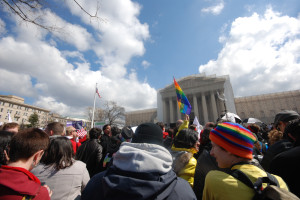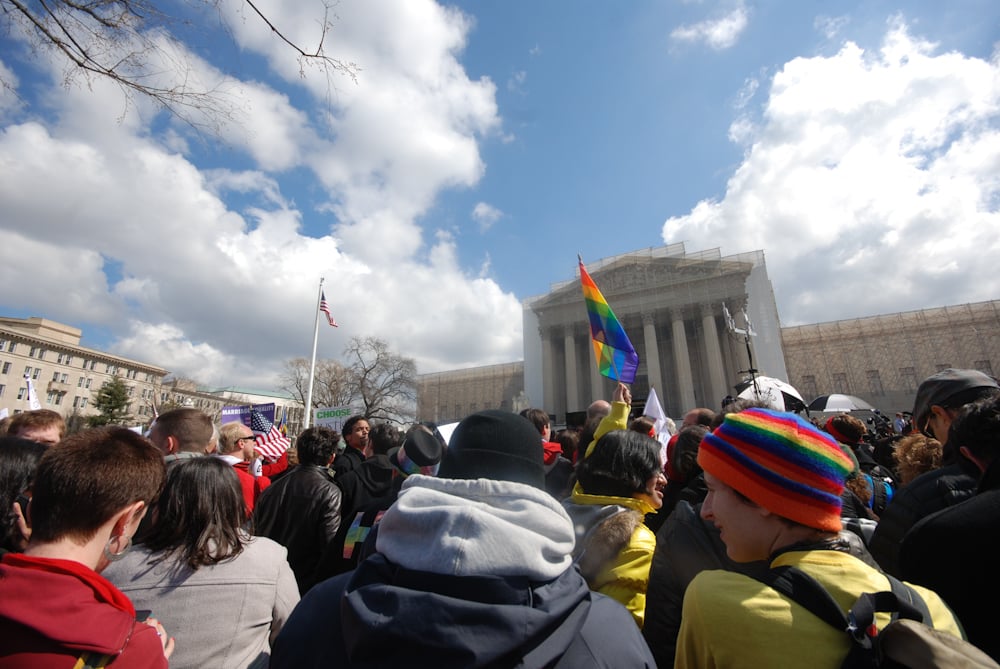As the Supreme Court turned its attention last week to gay marriage and the 1996 Defense of Marriage Act (DOMA), Stanford Law School students played a central role in securing support for an amicus brief deployed in oral arguments against DOMA in United States v. Windsor.

DOMA, a federal law that restricts federal benefits and denies interstate recognition to same-sex marriages, has been found unconstitutional by several lower courts. In Windsor, a coalition of prominent military and national security officials submitted a brief addressing the legislation’s impact on the military.
“DOMA violates the military’s… commitment to provide for all service members and their families,” reads Section II of the brief, which was written by the Washington, D.C.-based law firm Sidley Austin LLP. “There is no question that DOMA discriminates against certain legally married service members and veterans and their families.”
The brief identified healthcare, housing, education and survivorship benefits as some of the areas in which DOMA allegedly discriminates against gay and lesbian service members, and it claimed that DOMA has a negative effect on recruiting efforts, constituting “an affront to core military values.”
“What is driving this from our perspective and our clients’ perspective is we are talking about people who serve and sacrifice and whose families sacrifice so much for our country,” said J.P. Schnapper-Casteras ’05 M.A. ’05 J.D. ’08, an associate at Sidley Austin who was heavily involved in the writing of the brief. “There’s a core feeling that they deserve to get the same benefits as everyone else, regardless of their sexual orientation.”
Soliciting support
Jake Klonoski J.D. ’13 said that Pamela Karlan, a professor of law who served as part of the plaintiff’s legal team in Windsor, reached out to him to help garner support and signatories for the brief. Klonoski, a Navy veteran, had helped found the Stanford Law Veterans Organization.
Along with several other students, Klonoski sent out emails asking members of the Stanford veterans community to present the brief to military officials across the country in an effort to secure their signatures. Thirty individuals and two military support organizations ultimately signed the brief.
“The group at Stanford is a really tangled and wide-ranging network of people that know people that are important,” Klonoski said. “Even if people don’t necessarily know admirals and generals at Stanford, they worked for people at other places so they often asked their own bosses and engaged a lot of people they knew.”
The students’ efforts initially targeted Stanford-based officials such as former Special Assistant to the President for National Security Affairs Coit Blacker, former Ambassador to Afghanistan Karl Eikenberry M.A. ’94 Ph.D. ’13, former Senator Russ Feingold, former Secretary of Defense William Perry ’49 M.S. ’50, former Secretary of State Condoleezza Rice, retired Admiral Gary Roughead and former Secretary of State George Shultz. Of that group, Blacker, Feingold and Perry signed the brief.
Feingold, who said that it is “absolutely clear that DOMA discriminates against legally married service members,” was one of 14 senators to vote against DOMA in 1996.
“It’s well past time for the Court to reverse a statute that has caused so much pain because of a shameful moment of political expediency,” Feingold wrote in a statement in which he also called the legislation a “hateful measure.”
According to Klonoski, students and veterans at peer institutions like Harvard, Princeton and Yale also worked to secure support for the brief.
“What’s really unique about this case is that it’s a coalition of individuals, not a preset institution,” Schnapper-Casteras noted. “It’s folks that we had to corral from all walks of life and speak with them and get them to sign on.”
Klonoski framed the process of gathering signatures as a “huge social network experiment,” with a positive outcome emerging from the connection between Stanford and the military.
“There are liberals who care a lot about these issues and veterans, who are more likely to be conservative,” Klonoski said. “These two groups are supposedly antithetical, but here the synergy of having them in the same place was, to me, really wonderful.”
The Supreme Court is expected to release its verdict on United States v. Windsor in June.
